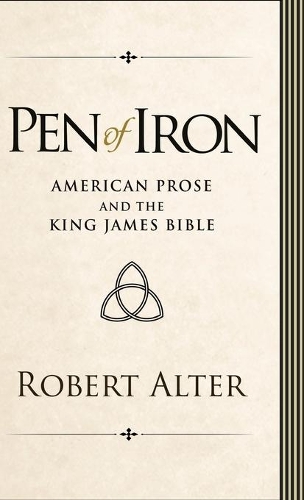
Pen of Iron: American Prose and the King James Bible
(Hardback)
Publishing Details
Pen of Iron: American Prose and the King James Bible
By (Author) Robert Alter
Princeton University Press
Princeton University Press
11th May 2010
United States
Classifications
Tertiary Education
Non Fiction
810.93822
Physical Properties
Hardback
208
Width 140mm, Height 216mm
369g
Description
The simple yet grand language of the King James Bible has pervaded American culture from the beginning. This book traces the ways that American novelists ranging from Melville, and Faulkner to Marilynne Robinson, and Cormac McCarthy - have drawn on the resources of the canonical English Bible to fashion their own styles and visions of reality.
Reviews
"As a leading scholar and translator of the Bible, who is also deeply knowledgeably about American literature, Robert Alter is ideally suited to study this complicated inheritance... Pen of Iron makes a convincing case that it is impossible to fully appreciate American literature without knowing the King James Bible--indeed, without knowing it almost instinctively, the way generations of Americans used to know it."--Adam Kirsch, New Republic "In Pen of Iron, the eminent Bible scholar and translator Robert Alter recounts a small yet telling part of the story of American literature's attunement to the King James Bible. Exploring the way the KJB has impacted both the prose and worldviews of select American authors--mainly Lincoln, Melville, Faulkner, Hemingway, Bellow, and Cormac McCarthy--Alter shows that, even when they parody it or contend with its legacies (as Melville and Faulkner did), the King James Bible remains an enduring point of reference, if not a moral center of gravity, in their work."--Robert Pogue Harris, New York Review of Books "Alter's short book spins off enough sparkling asides to inspire a shelf of very long volumes... [T]he result is a treasure of insight and a welcome stimulus to Christian reflection."--Mark Noll, Books & Culture "Alter's book is tightly focused and sweeping in the specificity of its claims. He takes a commonplace of conventional wisdom--the ubiquity the Bible once had in American elite culture--to argue that the King James translation created 'the foundational language and symbolic imagery' of the whole of American culture, especially its prose fiction."--David E. Anderson, Religion and Ethics Newsweekly "Pen of Iron is a work of lofty literary scholarship, and Alter is addressing a readership that already speaks his language and is ready to receive his wisdom. Indeed, the book is based on a series of lectures that Alter delivered at Princeton University in 2008. But it is also true to say that he is not unlike a biblical prophet, speaking truth to the power of the popular culture and exhorting us to be better and more discerning reader."--Jonathan Kirsch, Jewish Journal "Alter's intelligent treatments of several major works--principally Moby-Dick, Absalom, Absalom!, Seize the Day, and Marilynne Robinson's justly applauded novel Gilead (2004)--does more than simply explain allusions to biblical texts. He is interested in the ways in which American writers incorporate the stylistic traits of the King James Version for their own purposes, even when they are not themselves rooted in a Christian or biblical world view."--Barton Swaim, New Criterion "This well-written, thought-provoking book doesn't take too long to read."--Christian Century "Pen of Iron, which reads like a collection of essays, expands our understanding of how the King James Version of the Old Testament has influenced American fiction. Even more, Alter demonstrates the power the style of the translation had on the work of many of our most important writers."--Nancy Coffey Hefferman, Anglican And Episcopal History "Robert Alter is one of our most astute readers of both sacred and secular texts."--Ralph C. Wood, Journal of Church and State
Author Bio
Robert Alter has taught Hebrew and comparative literature at the University of California, Berkeley, since 1967. The author of more than twenty books, he has also published four volumes of Bible translation, most recently "The Book of Psalms: A Translation with Commentary" (Norton). In 2009, Alter received the Robert Kirsch Award from the "Los Angeles Times" for lifetime contribution to American letters.
